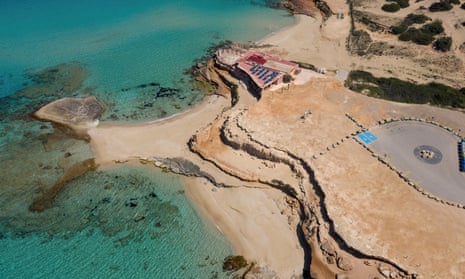Ibiza welcomes more than three million visitors during the summer months, pumping billions into its economy. Close to 75% of the island’s 147,000-plus population get their income from tourism, directly and indirectly – besides the fabled nightclub scene, there’s the hotels, Airbnbs, restaurants, bars, shops, taxis, and other businesses that exist because of the pull of the clubs. But a huge question mark hangs over them all, with the clubs beginning to cancel their summer seasons due to coronavirus.
So far Hï Ibiza, Ushuaïa, Amnesia and Eden have all cancelled their May calendar. Pacha hosted a virtual house party with a promise to “#seeyousoon”; their latest social media post stating, “After this moment’s respite, Pacha and Ibiza will look even more beautiful.” DC-10 have cancelled their opening party and said they are currently unable to confirm any future dates at the club. Privilege have yet to comment.
Some hope that some semblance of a season may be possible. A campaign called Move Your Spring launched a few weeks ago to encourage holidaymakers to shift bookings to later in the year, with an extension of the season to November touted as a solution. It doesn’t look good: Spain’s prime minister, Pedro Sánchez, has announced plans for a cautious de-escalation to a “nueva normalidad”, or new normal, planning to gradually reopen businesses over an eight-week period starting this week. But the plan is reliant on people adhering to guidelines and preventing a second outbreak, not going to nightclubs.
Radio 1 DJ Pete Tong has been visiting the island since the late 1980s and hasn’t missed a season since 1991. “I work behind the scenes at Pacha and I think pretty much everybody’s accepted now that there won’t be a season, not as we know it anyway,” he says.
Tong explains that clubs with smaller capacities could open up with only local DJs playing. “I think that’s where everybody’s at,” he adds. “Certainly all the major clubs have come to that conclusion, with a few exceptions where people are still thinking they’re going to experience a miracle and defy the world.”

So many other variables mean the chances of the season going ahead are slim. How will the clubs manage social distancing regulations? How many airlines will fly to the island, and will anyone want to board a plane? Even if they did, will they have the money? “The majority of the bums on seats in Ibiza are Brits, Germans, Dutch, from the working classes, who won’t have the money and will be naturally very sceptical of travelling abroad this summer,” says Ed Karney, director of Grade Management, whose operations have almost entirely halted as the artists they manage have been grounded.
Besides the local businesses, many individuals who work on the island are freelance, using the money they make in the summer to live until the next season. The Spanish government have offered support to those in need, giving out low interest loans of up to €900 (£790) to cover rent – with six to 10 years to pay them back – plus a ban on evictions for six months. But during the winter a lot of the self-employed (autonomo, as they’re known) business owners put their companies on pause so they don’t have to pay social security fees while they’re not in operation. This means they’re not eligible for government assistance.
Caritas, one of the main charities on the island, has reported queues for food packages. Supermarkets have set up makeshift food banks placing empty trolleys around their stores for people to donate items. Local charity Food for Ibiza supports about 25 families with food donations through the winter, but are extending their operation to continue through the summer. Cristóbal, a small outfit that has been supporting vulnerable members of the island’s community for the last five years, has also reported an increase in demand for its services.
“There’s a side to Ibiza that people don’t see, where people are already struggling,” says Rakhee, a 38-year-old private chef who’s been living and working in Ibiza for six years. “It can be a tough island to live on, especially in the winter time.” Her business is taking a big hit ahead of what she had hoped would be a successful season and she will now compete with many others for a handful of jobs.
A VIP concierge, who asked not to be named, highlighted the fragility of the “summer on, winter off” lifestyle. “The concierge guys are bricking it. One of my friends has this group from Kazakhstan. They’ll come and spend about €300,000 in a week and that one job covers him for the year,” he says. “These people can’t come now. Most of these [concierges] make their money in the summer, go off travelling in the winter, spend all their money and come back the next summer to make it all again. They’re in a really bad position.”

Leah Timmins, director of Decadance Agency, has 38 dancers on her books who appear at the major clubs on the island. She says these performers will be the first thing to go as venues cut costs and scale down. “It’s scary because rents are extortionate,” she says. “You have to suck it up for five months here and make it work. In London you can stretch out your income annually and survive, but without those five months how are people going to pay up to €1,400 a month for a room? The government scheme won’t even cover rent for some people.”
Phil Mandelbaum, owner of Octan, a medium-sized club that once belonged to UK franchise Sankeys, is sure the clubs will survive, explaining that most of them own their premises so won’t have to worry about paying the rent even if they’re empty all summer. “The biggest issue is all the little businesses that live around the nightclubs,” he says. “You’ll see 15 bars along the same street as one of the main clubs, places that only open in the summer and stay afloat because people stop there for a drink on the way to a club. That’s a big part of Ibiza, the small bars and the shops. I’m expecting many of them to disappear.”
But people are coming together to support one another. As well as the charitable organisations, a recent livestream event called Ibiza Needs Ibiza Beats has so far raised more than €9,000 for the Red Cross; the crew at DC-10, one of the island’s most respected and influential clubs, have donated money, masks and gloves to the island’s hospital and a care home for the elderly. “Our mission is to bring Ibiza back,” says Nicola “Nick Love” Benedetti, worldwide manager and director of DC-10 and Circoloco. “Not just DC-10, not one restaurant or one other club, the priority needs to be all of us working together to save the island.”

A slot at DC-10 or other big clubs can launch a DJ’s career, and hits get made in Ibiza, propelling producers into the limelight and allowing them to tour for years afterwards. Luke Neville, owner of PR firm Listen Up, works with record labels to build up the summer’s big anthems months ahead of the season. “We’ve got those tunes sitting here and it’s like, what are we going to do with them? Do we push them back to next summer?” he says. “They’re going to sound great regardless but the only medium you’re going to hear them through for now is livestreams.”
Livestreamed DJ sets have provided some solace for DJs and fans, but they can’t substitute being on a dancefloor. “Good music will always be good music but there’s something about hearing a record and going, that was the tune me and my mates were listening to in Ibiza last summer,” Neville says. As livestreaming continues to evolve, a more structured economic model will emerge – companies like Side Door, StageIt and Looped are helping artists monetise streams with ticketed access. Any income, though, is likely to pale in comparison with what can be earned on the road.
José Woldring is head of MediaNanny, a Dutch PR firm that counts megastars David Guetta and Martin Garrix as well as Ibiza club Ushuaïa among its clients. She worked with Guetta on a livestream from downtown Miami that attracted more than 12m viewers and raised $700,000 (£565,000) for numerous charities. “Ushuaïa is doing a lot of research and considering the worst-case scenario. They’re looking into opening a virtual club with the artists that they have,” she says, explaining that everyone is trying to find a way of maintaining a presence: “If you’re going to close your doors and not post anything on socials, it’s counterproductive.” IMS, the conference that signals the start of the season, is duly going online at the end of May.
Ibiza’s bloated VIP culture has come under scrutiny for years now, and local talent has been largely overlooked in favour of the big name international DJs. Year after year of heavy tourism has certainly put a lot of strain on the ecosystem, particularly its coastline, which saw a 60.8% increase in urbanisation between 1990 and 2012, according to a study by the Ibiza Preservation Fund. But with many islanders set to endure the most difficult summer of their lives, it will now need the businesses and artists that have leveraged the fabled magic of Ibiza to lend them their support.
“Ibiza has seen a lot of crises in its history, many people gave up on it years ago, thinking it was finished,” says DC-10’s Benedetti. “But it will stand up again, even after the pandemic, to prove that it was, is and always will be the magic island.”
